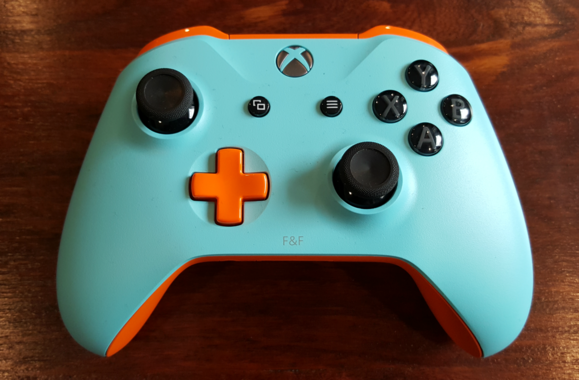
Last year Microsoft released the $150 high-end Elite controller for a segment of the market traditionally supported by third parties and aftermarket parts dealers. That undertaking was by all accounts a rousing success, way beyond Microsoft’s predictions.
And so at E3 this year Microsoft announced it would be stepping into another traditionally aftermarket realm: custom controllers. Xbox Design Lab lets you construct your own Xbox One S controller: For $20 more than the stock Xbox One S controller (available for its list price of $60 on Amazon), you can select the color of the front, rear, bumpers and triggers, D-pad, thumbsticks, face buttons, and the Menu and View buttons.
Artistic expression
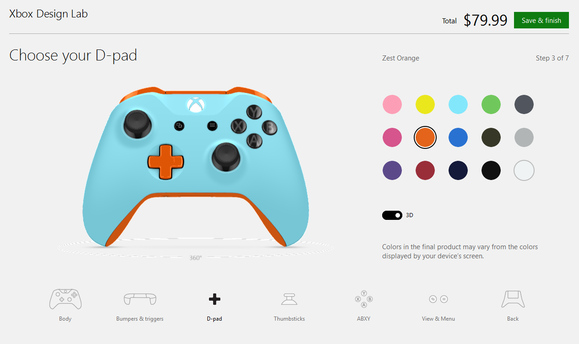
I took a spin through the process, which is how I ended up with my GT40-inspired controller. The Design Lab website is easy enough to navigate, though much harder to use effectively. You can create some truly awful monstrosities.
Honestly, the pool of colors to choose from isn’t that broad, especially for some of the components, like the thumbsticks. Many of the colors aren’t complementary, either. It’s much, much easier to design something hideous than attractive. Microsoft can tout however many millions of color combinations, but the reality is there are probably a hundred that look reasonably inoffensive. Maybe a few dozen that look capital-G good.
But you still get quite a bit more choice than I’m used to with first-party controllers. I spent about an hour tinkering with the website, creating various Frankensteins and even a tongue-in-cheek rendition of the stock Xbox One controller before looking at the highest-rated community designs for inspiration and settling on powder blue and orange.
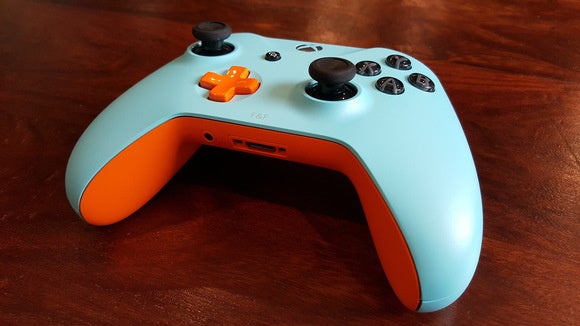
I’m pretty excited by the result. The color here is infused into the plastic, not painted on afterward like with many third-party shops’ custom controllers—a small distinction, but vital to maintaining that “official first-party controller” aesthetic. And the pad looks even better in person than it did on the site—the difference between the matte plastic of the body and the glossy plastic of the bumpers/triggers is a subtle touch I didn’t anticipate.
Place in the lineup
Now, the big question: How does this controller (regardless of custom color or not) stack up against the original Xbox One controllers?

Short answer: The Xbox One Elite controller is still best of the best. That’s no surprise to me—I’ve still got an Elite controller hooked to my PC and use it weekly for various console-first games.
However, the Xbox One S controller is a step up from the original version of the Xbox One controller. It even has a lead over last year’s slight redesign. First and foremost, the Xbox One S controller has Bluetooth. You no longer need to buy Microsoft’s massive Xbox One wireless dongle then try to fit it into one of your USB slots (while blocking half a dozen others in the process).
You can only connect one Xbox One S controller at a time with Bluetooth, but I doubt most people care about that limitation. And it’s rippled into other environments too—Valve issued an update so the Steam Link works seamlessly with the Xbox One S controller through Bluetooth, too. That makes the Xbox One S controller more viable for wireless PC use (say, in the living room) than the Xbox One controller.
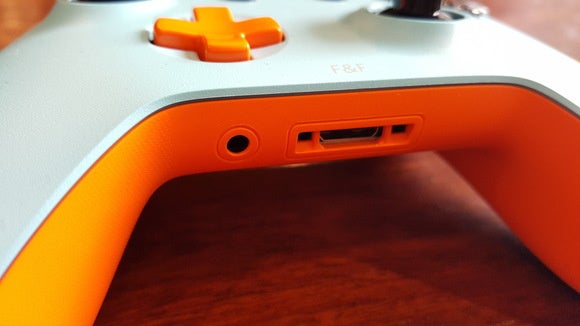
It also folds in improvements Microsoft has introduced into the stock Xbox One controller since 2013, like the 3.5mm jack on the bottom of the controller. The requisite chat adapter thingamajig you needed for the original Xbox One controller was an ugly wart, and I’m happy to see it die. You also get the myriad small design tweaks: The rear of the controller is now textured where the original stock Xbox One controller was smooth. The central Xbox logo jewel is slightly smaller, and the contour lines around it have been adjusted. The controller’s overall shape has been slightly tweaked for a more ergonomic grip.
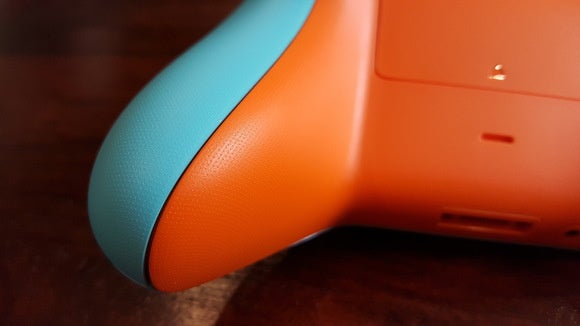
And the bumpers are now softer and squishier—more like the Elite controller. That’s excellent news, because the original Xbox One’s bumpers were so loud and stiff in 2013 as to be obnoxious. Unfortunately the Xbox One S D-pad seems similarly soft and squishy, which I don’t like. It’s still better than the Xbox 360’s mushy D-pad, but it’s a step down from the original Xbox One controller.
Bottom line
My official ranking overall? The Xbox One Elite controller on top, then the Xbox One S, Xbox 360, and in last place the original stock Xbox One controller. The Elite still has quite a bit going for it—even after almost a year of use, my Elite’s analog sticks still glide like they’ve been newly oiled. It’s a beautiful controller, and I’d love for Microsoft to create an Xbox Design Lab for custom Elite controllers.
But the Xbox One S controller, in all its various color variants? Sure, you can get the stock Xbox One S controller for less, but the customization is damn nice. The Xbox Design Lab would’ve been great to have while growing up in a household with three other siblings. We could’ve settled the “No, this is my controller” argument once and for all.
Hell, that’s pretty much my plan for this one. The powder blue controller? That’s mine now. You want to play at my house, you can use the Xbox One controller that came with my console, clicky bumpers and all.




